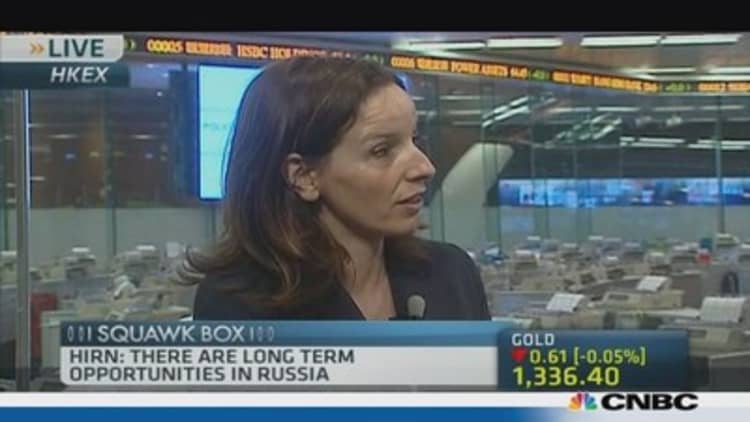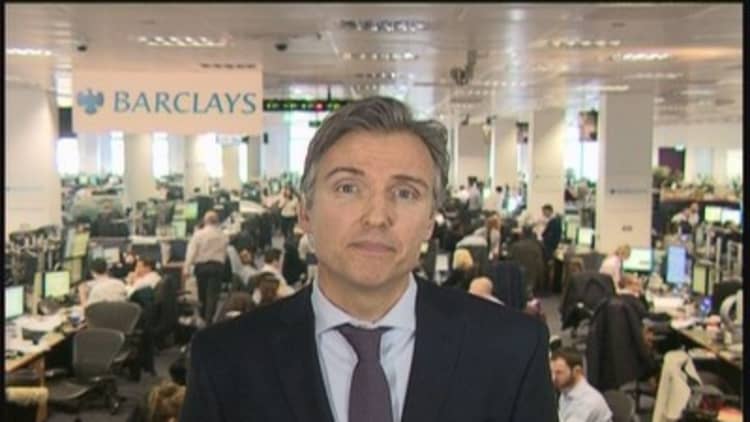
In the wake of the Ukraine crisis, Russian stocks have tanked, but as tensions appear to be easing, some analysts see an opportunity for cautious bargain hunting.
"The market was already very cheap before the crisis," said Karine Hirn, CEO at East Capital, which has around $4.5 billion under management in the region.
(Read more: Cramer sees buying opportunities in Ukraine upheaval)
"Now, we have around 3.8 (times) price to earnings. Of course, some of the investment opportunities that arise can be compelling," she told CNBC. By way of comparison, the broader emerging European markets are trading around 6.3 times earnings and emerging Asian markets are at 10.5 times, according to data from Credit Suisse.

"But it's all about how long term our investors are," Hirn cautioned. "You need to see what's going on first before actually really moving in."
There's a lot of tension in the region to make investors nervous.
The bourse lost nearly $60 billion in market capitalization on Monday, ending the session down 11 percent, its worst fall in five years. However, it regained around 5 percent on Tuesday before finishing nearly flat on Wednesday. The country's central bank jacked up interest rates and Reuters reported it spent as much as $12 billion to support a weak currency.
Tensions spiked after Russian President Vladimir Putin said over the weekend he reserved the right to invade Ukraine to protect ethnic Russians and his country's interests.
(Read more: Can Russia take my Pepsi? Consumer brands at risk)
But he has appeared to back away from military action in the Ukrainian region of Crimea. Troops that had been on a training exercise near Ukraine's border returned to base and Putin stated that any force used would only be a "last resort." European Union (EU) officials will meet in Brussels on Thursday to discuss the situation.
Despite the tensions, others also see the potential for bargains in Russia's market.
"Within the emerging markets, it's probably one of the candidates that ought to have done a lot better even coming into the Ukraine crisis," said Sean Darby, chief global equity strategist at Jefferies, noting his bank is long on the market. "It's very cheap," and offers an around 5 percent dividend yield, he added.
"They've shot themselves in the foot," he acknowledges, but he adds, "There's nothing inherently wrong with the solvency of the financial system. Unless they put in sanctions, it's hard to see it having an effect on the economy."
(Read more: Belligerent Putin dismisses 'tactical' market turmoil)
Darby isn't overly concerned that the country is very dependent on its oil exports, as it's well known and oil prices have stayed relatively high for around three years.
Hirn noted East Capital has generally avoided playing the commodity exporters, but the recent market turbulence may have offered some opportunities.
"The ruble has depreciated and might be kept under pressure. And this is benefitting exporters and commodities," Hirn said. "We've actually always been very strongly underweight on commodities, but right now tactically we are actually increasing our exposure to exporters."
But she believes the real opportunities may be in the consumer sector. While most emerging markets are a play on the rising middle class and growing consumer spending, Hirn notes Russia's middle class has already "exploded," with around 70 percent of the population already in that income bracket.
(Read more: Could Ukraine trigger a full-blown EM crisis?)
"What is interesting with the Russian consumers is they like spending. They do not save, they spend. And that's why it's one of the healthiest and dynamic consumer markets in the world," Hirn said.
Although she doesn't expect the West to impose sanctions on the country, she believes any restrictions on imports will actually benefit the country's domestic consumer players.
To be sure, not everyone is jumping at the opportunity to scoop up Russian equities.
"The lower valuations are for a reason," said Meike Bliebenicht, product specialist at HSBC Global Asset Management. While her funds had a preference for Russia a while ago, they went neutral on concerns over internal political and structural issues and its main trading partner, the eurozone. She doesn't expect HSBC to change its position.
—By CNBC.Com's Leslie Shaffer; Follow her on Twitter @LeslieShaffer1

